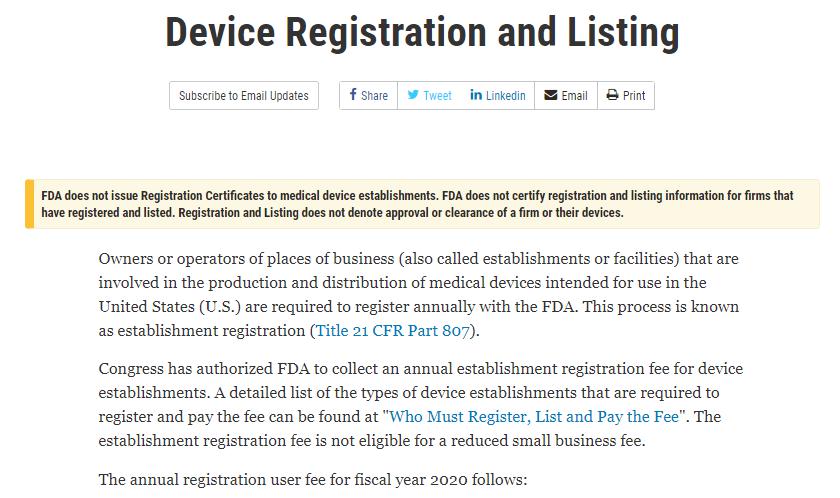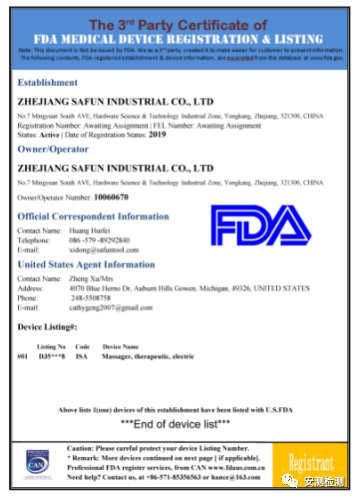The FDA issued a notice entitled “device registration and listing” on its official website on 23 June, which emphasized that:
FDA does not issue Registration Certificates to medical device establishments. FDA does not certify registration and listing
information for firms that have registered and listed. Registration and Listing does not denote approval or clearance of a firm
or their devices.
The issues we need to pay attention to in FDA registration are as follows:
Question 1: which agency issued the FDA certificate?
A: there is no certificate for FDA registration. If the product is registered with FDA, the registration number will be obtained. FDA will give the applicant a reply letter (signed by the chief executive of FDA), but there is no FDA certificate.
FDA’s announcement of such a notice at this time is a strong reminder! Due to the recent development of the epidemic situation in the United States, the demand for medical epidemic prevention products exported to the United States has increased greatly, and the demand for export registration has also increased
When some enterprises impersonate FDA to issue certificates to manufacturers, some distribution enterprises may get fake “FDA certificates” when consulting manufacturers.
Question 2: does FDA need a certified laboratory?
A: FDA is a law enforcement agency, not a service agency. If someone says they are an FDA certification laboratory, they are at least misleading consumers, because the FDA has no public service
Sex certification agencies and laboratories, there is no so-called “designated laboratory.”. As a federal law enforcement agency, FDA should not be engaged in such things as being both a referee and an athlete. FDA will only test service
The GMP quality of the laboratory will be recognized, and the qualified one will be issued with the certificate, but it will not be “designated” or recommended to the public.
Question 3: does FDA registration require a U.S. agent?
A: Yes, an enterprise must appoint a U.S. citizen (company / Association) as its agent when registering with FDA. The agent is responsible for the process services located in the United States, which is the media to contact FDA and the applicant.
Common mistakes in FDA registration
1. FDA registration is different from CE certification. Its certification mode is different from the CE certification product testing + reporting certificate mode. FDA registration actually adopts the integrity declaration mode, that is, you have a good faith declaration mode for your own products
In accordance with the relevant standards and safety requirements, and registered in the U.S. Federal website, if there is an accident with the product, then it has to bear the corresponding responsibility. Therefore, FDA registration for most products, there is no sending sample test
And the statement of certificate.
2. The validity period of FDA registration: FDA registration is valid for one year. If it is more than one year, it needs to be re submitted for registration, and the annual fee involved also needs to be paid again.
3. Is FDA registered with a certificate?
In fact, there is no certificate for FDA registration. If the product is registered with FDA, the registration number will be obtained. FDA will give the applicant a reply letter (signed by the chief executive of FDA), but there is no FDA certificate.
The certificate we usually see is issued by the intermediary agency (registration agent) to the manufacturer to prove that it has helped the manufacturer to complete the “production facility registration and product type registration” required by FDA
(establishment registration and device listing), the completed mark is to help the manufacturer obtain the FDA registration number.
According to the different risk levels, FDA divides medical devices into three categories (I, II, III), and class III has the highest risk level.
FDA has clearly defined the product classification and management requirements for each medical device. At present, there are more than 1700 kinds of medical device catalogue. If any medical device wants to enter the U.S. market, it must first clarify the classification and management requirements of the products applied for marketing.
After clarifying the above information, the enterprise can start to prepare the relevant application materials, and report to the FDA according to certain procedures to obtain approval. For any product, enterprises need to register and list products.
For class I products (accounting for about 47%), the general control is implemented. The vast majority of products only need to be registered, listed and implemented GMP standards, and the products can enter the U.S. market (very few of them are connected with GMP)
A very small number of reserved products need to submit 510 (k) application to FDA, namely PMN (premarket notification));
For class II products (accounting for about 46%), special control is implemented. After registration and listing, enterprises need to implement GMP and submit 510 (k) application (few products are 510 (k) exemption);
For class III products (about 7%), pre marketing license is implemented. After registration and listing, enterprises must implement GMP and submit PMA (premarket application) application to FDA (Part III)
PMN).
For class I products, after the enterprise submits relevant information to FDA, FDA only makes an announcement, and no relevant certificate is issued to the enterprise; for class II and III devices, the enterprise must submit PMN or PMA, and FDA will
Give the enterprise a formal market access approval letter, that is, allow the enterprise to directly sell its products in the U.S. medical device market in its own name.
Whether to go to the enterprise for GMP assessment in the application process is decided by FDA according to the product risk level, management requirements and market feedback and other comprehensive factors.
From the above, we can see that most of the products can obtain FDA certification after registration, product listing and implementation of GMP for medical devices, or submission of 510 (k) application.
How to check whether the product has been listed by FDA or registered in 510k?
The only authoritative way: check on the FDA website
Post time: Jan-09-2021



